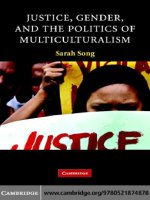0521869404 cambridge university press legal reform and administrative detention powers in china jan 2008
Bạn đang xem bản rút gọn của tài liệu. Xem và tải ngay bản đầy đủ của tài liệu tại đây (3.06 MB, 504 trang )
This page intentionally left blank
L E G A L R E F O R M A N D A D M I N I S T R AT I V E
DETENTION POWERS IN CHINA
Using a new conceptual framework, the author examines the processes
of legal reform in post-socialist countries such as China. Drawing on
Bourdieu’s concept of the ‘field’, the increasingly complex and contested
processes of legal reform are analysed in relation to police powers.
The impact of China’s post-1978 legal reforms on police powers is
examined through a detailed analysis of three administrative detention
powers: detention for education of prostitutes; coercive drug rehabilitation; and re-education through labour. The debate surrounding the
abolition in 1996 of detention for investigation (also known as shelter
and investigation) is also considered. Despite over twenty years of legal
reform, police powers remain poorly defined by law and subject to minimal legal constraint. They continue to be seriously and systematically
abused. However, there has been both systematic and occasionally dramatic reform of these powers. This book considers the processes which
have made these legal changes possible.
s a r a h b i d d u l p h is Associate Director (China) of the Asian Law
Centre at the University of Melbourne, where she has established the
Law School’s Chinese law programme.
C A M B R I D G E S T U D I E S I N L AW A N D S O C I E T Y
Cambridge Studies in Law and Society aims to publish the best scholarly
work on legal discourse and practice in its social and institutional contexts, combining theoretical insights and empirical research.
The fields that it covers are: studies of law in action; the sociology
of law; the anthropology of law; cultural studies of law; including the
role of legal discourses in social formations; law and economics; law and
politics; and studies of governance. The books consider all forms of legal
discourse across societies, rather than being limited to lawyers’ discourses
alone.
The series editors come from a range of disciplines: academic law;
socio-legal studies; sociology; and anthropology. All have been actively
involved in teaching and writing about law in context.
Series Editors
Chris Arup Victoria University, Melbourne
Martin Chanock La Trobe University, Melbourne
Pat O’Malley Carleton University, Ottawa
Sally Engle Merry Wellesley College, Massachusetts
Susan Silbey Massachusetts Institute of Technology
Books in the Series
The Politics of Truth and Reconciliation in South Africa
Legitimizing the Post-Apartheid State
Richard A. Wilson
Modernism and the Grounds of Law
Peter Fitzpatrick
Unemployment and Government
Genealogies of the Social
William Walters
Autonomy and Ethnicity
Negotiating Competing Claims in Multi-Ethnic States
Yash Ghai
Constituting Democracy
Law, Globalism and South Africa’s Political Reconstruction
Heinz Klug
The New World Trade Organization Agreements
Globalizing Law through Services and Intellectual Property
Christopher Arup
The Ritual of Rights in Japan
Law, Society, and Health Policy
Eric A. Feldman
The Invention of the Passport
Surveillance, Citizenship and the State
John Torpey
Governing Morals
A Social History of Moral Regulation
Alan Hunt
The Colonies of Law
Colonialism, Zionism and Law in Early Mandate Palestine
Ronen Shamir
Law and Nature
David Delaney
Social Citizenship and Workfare in the United States and
Western Europe
The Paradox of Inclusion
Joel F. Handler
Law, Anthropology and the Constitution of the Social
Making Persons and Things
Edited by Alain Pottage and Martha Mundy
Judicial Review and Bureaucratic Impact
International and Interdisciplinary Perspectives
Edited by Marc Hertagh and Simon Halliday
Immigrants at the Margins
Law, Race, and Exclusion in Southern Europe
Kitty Calavita
Lawyers and Regulation
The Politics of the Administrative Process
Patrick Schmidt
Law and Globalization from Below
Toward a Cosmopolitan Legality
Edited by Boaventura de Sousa Santos and Cesar A. Rodriguez-Garavito
Public Accountability
Designs, Dilemmas and Experiences
Edited by Michael W. Dowdle
Law, Violence and Sovereignty Among West Bank Palestinians
Tobias Kelly
Law and Society in Vietnam
The Transition from Socialism in Comparative Perspective
Mark Sidel
Legal Reform and Administrative Detention Powers in China
Sarah Biddulph
LEGAL REFORM AND
ADMINISTRATIVE DETENTION
POWERS IN CHINA
Sarah Biddulph
CAMBRIDGE UNIVERSITY PRESS
Cambridge, New York, Melbourne, Madrid, Cape Town, Singapore, São Paulo
Cambridge University Press
The Edinburgh Building, Cambridge CB2 8RU, UK
Published in the United States of America by Cambridge University Press, New York
www.cambridge.org
Information on this title: www.cambridge.org/9780521869409
© Sarah Biddulph 2007
This publication is in copyright. Subject to statutory exception and to the provision of
relevant collective licensing agreements, no reproduction of any part may take place
without the written permission of Cambridge University Press.
First published in print format 2007
ISBN-13 978-0-511-37889-8
eBook (NetLibrary)
ISBN-13 978-0-521-86940-9
hardback
Cambridge University Press has no responsibility for the persistence or accuracy of urls
for external or third-party internet websites referred to in this publication, and does not
guarantee that any content on such websites is, or will remain, accurate or appropriate.
For David
CONTENTS
Preface
Abbreviations
page xiii
xvi
Part 1: Introduction and conceptual framework
1 The problems of legal reform of police administrative
detention powers
3
1 Introduction
2 The administrative detention powers
3 Legal reform of administrative detention powers: the demise of
detention for investigation and the issues in this book
4 Questions and hypothesis
5 Conceptual framework: legal reform and institution building as
a contested process
6 Organisation of this book
18
20
2 The legal field and the process of legal reform since 1978
26
1 Introduction
2 Legal reform and institution building as a contested process: the
legal field
3 Adapting the concept of the legal field to the Chinese context
4 The changing nature of legal instrumentalism: pluralisation
from within
5 Actors
6 Conclusion: the legal field and the problem of
administrative detention
3
5
10
12
26
27
40
43
55
57
Part 2: Social order and administrative detention
3 Historical antecedents: the 1950s and
administrative detention
1 Introduction
2 Developing approaches to dealing with social disorder and the
politically suspect
3 Strategies to eliminate prostitution in the 1950s
61
61
62
70
ix
CONTENTS
4 Strategies to eliminate drug addiction in the 1950s
5 Development of Re-education through Labour in the 1950s
and 1960s
6 Registration and detention: managing the floating population
7 Conclusion
4 Social order, the ‘Hard Strike’ and administrative
detention powers
1 Introduction
2 The contemporary problem of social order and crime
3 The contemporary social order policy context of administrative
detention: the Comprehensive Management of Public Order
(‘CMPO’)
4 Social order and the construction of a Socialist Spiritual
Civilisation
5 The CMPO
6 Strengthening leadership over the CMPO
7 Police social order powers
8 Punishment of crime: the Hard Strike
9 Expansion of administrative detention during Hard Strikes and
other specialist struggles
10 Contests over defining the ideological nature of and practical
strategies for punishment of crime
11 Conclusion
5 Revival of administrative detention in the reform era:
prostitutes and drug addicts
1
2
3
4
Introduction
Prostitution
Drug addiction
Conclusion
6 Re-education through Labour
1 Introduction
2 Reinvigoration of RETL after 1979
3 Conclusion
76
81
90
92
94
94
96
103
105
107
109
109
123
139
141
149
152
152
153
177
191
193
193
194
218
Part 3: Legal reform and its impact on administrative detention
7 Building a legal environment for police detention
1 Introduction
2 The political boundaries of police reform: Party leadership over
the police and enforcement policy
3 Rebuilding the public security organs
4 Limitations on institutional autonomy: Party leadership and
local control over police finances
5 Affirming law as the basis for governance
x
223
223
225
227
230
240
CONTENTS
6
7
8
9
Legislating powers
Giving administrative detention powers a legal basis
Procedural requirements in exercising administrative powers
Conclusion
8 Supervision of police conduct: legalisation and contest
1 Introduction
2 Strengthening supervision as a key component of administration
according to law
3 The MPS and departments
4 Supervision by the Discipline Inspection Committee and the
Ministry of Supervision
5 The NPC and local people’s congresses
6 Supervision initiated by citizen complaint
7 Conclusion
9 Legal reform catches up with administrative detention
1 Introduction
2 Legal reform of administrative detention powers: the demise of
detention for investigation
3 Law as the forum for debates about administrative coercive powers
4 The debate about RETL
5 Creating a new category of public order punishment: the security
defence punishment
6 Ongoing administrative legislative reform
7 Conclusion
248
256
267
271
275
275
277
280
286
287
290
327
331
331
332
340
341
345
348
350
Part 4: Analysis and conclusion
Conclusion: the field of law, the force of law and the
powers that be
1 Introduction
2 What are the continuities and discontinuities between
administrative detention in the reform and pre-reform era?
3 To what extent does law structure police powers relating to
administrative detention?
4 How does the use of the legal field as an analytical construct
illuminate our understanding of the processes of legal change of
police administrative detention powers?
5 Conclusion
Appendix 1: Index of Legislation, administrative regulations, rules,
normative documents, Party documents, speeches and cases
Bibliography
Index
353
353
353
358
362
371
374
424
477
xi
P R E FA C E
This book started its life in 1994 when I was sitting in a library in
China and came across some handbooks of police regulations that had
been misfiled. These handbooks opened the door to research on an area
that has taken me twelve years to complete. Throughout the extended
period of this project, I have accumulated many debts to a large number
of people who have helped and supported me in different ways.
My friends in China have helped me find documents and material;
discussed ideas and laws; and aided my understanding of the changing organisation and culture of power, which, from the outside, often
appears incomprehensible. I thank them especially because many had
real doubts about the advisability of a project on police detention powers, but nevertheless assisted me however they could.
Mal Smith was a friend and mentor for many years. He encouraged
me to start this project and to complete it. He is sorely missed. This work
was submitted as a PhD thesis at the University of Melbourne in 2004. I
owe a great debt of gratitude to my supervisors Michael Dutton and Pip
Nicholson. They did more to assist me with this project than supervisors
should humanly be asked. Without their comments, criticisms, advice
and unswerving support, this project would not be what it is now. All
errors of course are mine. My thanks to Jenny Morgan, Richard Mitchell,
Tim Lindsey, Sean Cooney, Lisa Stearns and Carol Jones who, along
with Michael Dutton, Pip Nicholson, Cheryl Saunders and Lawrence
Maher, read and commented on parts or all of this book. Comments and
suggestions provided by my two thesis examiners and by the referees for
this book have been of great help in focussing my thinking on a number
of issues and have assisted me as I finalised the manuscript.
My friends and colleagues in the Law School at the University of
Melbourne have been constantly supportive of me and interested in
this project, for which I am deeply grateful. Thanks too to Kathryn
Taylor and Kerstin Steiner, who helped me produce the final version,
and Ingrid Landau, who, with her sister Rose, carefully read the final
draft of this book and checked references for me.
xiii
PREFACE
My parents have supported me unswervingly throughout this project.
My mother read drafts and gave me endless encouragement; my father
took ownership of the thesis when it got too heavy.
Finally, my special thanks to David. He has supported and encouraged, cajoled and advised. His support kept me going to the end.
An earlier version of my discussion of the abolition of detention for
investigation in chapter 9 was published in ‘Mapping Legal Change in
the Context of Reforms to Chinese Police Powers’ in John Gillespie
and Pip Nicholson eds. (2005), Asian Socialism and Legal Change: The
Dynamics of Vietnamese and Chinese Reform, 212–38. Many thanks to
Maree Tait and Asia Pacific Press at the Australian National University
for allowing me to use portions of that article in this book.
Some comments on the sources used in this book are warranted.
When I started this research, the regulations, rules and other documents which form the basis of this work were not publicly available.
The regulatory infrastructure of administrative detention is contained
in a wide range of documents, including those issued by various organs
of the Chinese Communist Party, documents issued jointly by Party
organs and the State Council, State Council administrative regulations, ministerial and local rules and documents and speeches records
of meetings. A significant proportion of these are of restricted circulation. I relied heavily on the annual collection of regulations, rules
and normative documents compiled by the legal division of the Ministry of Public Security entitled Public Security Law Enforcement Manual
(Gong’an Jiguan Zhifa Shouce
) which changed its name
to Necessary Knowledge for Law Enforcement by Public Security Organs
(Gong’an Jiguan Zhifa Xuzhi
) from 1998. The volume for
the year 2004 was the last available at the time this manuscript was
completed.
Starting from the late 1990s a wider range of documents and commentary has become publicly available, though information on this topic
remains limited. I have also had access to some materials which are
unpublished or which I have obtained as photocopies. I have satisfied
myself that these materials are what they purport to be, but as they are
confidential, I am not able to give more complete references to them.
Where I have used these documents, I have set out their publication
details as photocopy materials. Access to this range of material gives
a unique opportunity to trace in detail the documentary account of
the development, reform and efforts to supervise administrative detention powers. I have used national statistics where possible, though in
xiv
PREFACE
some areas, such as my discussions of enforcement rates in respect of
prostitution and drug addiction, statistics are only available for certain
provinces and cities. I have used these rather than none at all, especially where they illustrate increased rates of enforcement during law
and order campaigns. Unfortunately, some material to which I would
have liked to have referred, including comprehensive statistics compiled by the Ministry of Public Security (‘MPS’), is classified at a higher
level of secrecy than the documents accessible to me.
Unless otherwise stated, translations of Chinese materials are my
own. I am grateful to Shi Chenxia for her assistance in checking the Chinese translations in the index of legislation and the glossary of terms at
the time my PhD was submitted. Translations of titles of legal materials,
Party documents and speeches are set out in Appendix 1, the index of
legislation.
xv
A B B R E V I AT I O N S
ALL
ALL Interpretation
Administrative Litigation Law 1989
SPC, Interpretation on Several Questions on
the Enforcement of the ‘PRC Administrative
Litigation Law’ 1999
APL
Administrative Punishments Law 1996
ARL
Administrative Review Law 1999
ARR
Administrative Review Regulations 1990
CASS
Chinese Academy of Social Sciences
CCP (‘Party’)
Chinese Communist Party
CCPCC
Central Committee of the Chinese
Communist Party
CMPO
Comprehensive Management of Public Order
CPL
Criminal Procedure Law 1996
CPPCC
Chinese People’s Political Consultative
Conference
Drugs Decision
NPCSC, Decision on the Prohibition of Drugs
1990
Five Major
CCPCC approving and issuing the Central
Cities Meeting
Political-Legal Committee Summary of the
Public Order Meeting of the Five Major Cities
of Beijing, Tianjin, Shanghai, Guangzhou and
Wuhan 1981
KMT
Guomindang
MoJ
Ministry of Justice
MPS
Ministry of Public Security
NPC
National People’s Congress
NPCSC
Standing Committee of the National People’s
Congress
PPL
People’s Police Law
PRC (also ‘China’)
People’s Republic of China
Prostitution Decision NPCSC, Decision on Strictly Prohibiting
Prostitution and Using Prostitutes 1991
xvi
ABBREVIATIONS
RETL
SAPL
SAPR
SPC
SPP
STDs
Supervision Law
Temporary Measures
USA
USSR
Re-education through Labour
Security Administrative Punishments Law
2006
Security Administrative Punishments
Regulations 1986
Supreme People’s Court
Supreme People’s Procuratorate
Sexually transmitted diseases
NPCSC, PRC Supervision Law of the
Standing Committees of Congresses at Each
Level 2006
MPS, Temporary Measures on Re-education
through Labour 1982
United States of America
Union of Soviet Socialist Republics
xvii
PA R T O N E
INTRODUCTION AND
CONCEPTUAL FRAMEWORK
C H A P T E R
O N E
THE PROBLEMS OF LEGAL REFORM
O F P O L I C E A D M I N I S T R AT I V E
DETENTION POWERS
1
INTRODUCTION
This book examines the impact of rebuilding the Chinese legal system
since 1978 on the administrative detention powers of the Chinese public
security organs (gong’an jiguan
, also referred to in this book as the
1
‘police’). The regulation and exercise of police administrative detention powers have arguably been amongst the most problematic areas in
the programme of rebuilding China’s legal system in the reform era.2
Until recently, the process of reconstructing the legal system appeared
to have limited impact on the definition and exercise of these powers.
This has been so for at least two reasons.
First, administrative detention powers are exercised alongside the
state’s criminal justice powers to target conduct considered to be socially
disruptive, to maintain public order, social stability and, ultimately,
political stability.3 Consequently, there has been a high degree of
political sensitivity surrounding these powers. Deng Xiaoping repeatedly asserted that success of the economic modernisation programme
1
2
3
The categories of forces falling within the definition of the people’s police (renmin jingcha
)
are set out in the PRC People’s Police Law 1995 (‘PPL’) at art. 2. They include: the public security
organs (gong’an jiguan
), the state security organs (guojia anquan jiguan
), the
) and RETL management organs (laodong jiaoyang guanli jiguan
police in prisons (jianyu
) and the judicial police (sifa jingcha
) of the people’s courts and people’s
procuratorates. In this book all references to ‘the police’ are to the public security organs.
By ‘reform era’, I refer to the period following the Decision of the Third Plenum of the 11th
Central Committee of the Chinese Communist Party (‘CCPCC’) in December 1978 to embark
on a programme of economic reform and modernisation and to reconstruct the legal system.
Petracca and Mong, 1990: 1101–2.
3
LEGAL REFORM AND ADMINISTRATIVE DETENTION POWERS IN CHINA
was premised on order and stability,4 a demand reiterated by Jiang
Zemin.5 The maintenance of social control since the introduction of
the economic modernisation policy in December 1978 has been so
important that it has led sociologist Borge Bakken to comment that
the policy of social control itself ‘has been one of the crucial pillars of
reform’.6
In recent years, problems of social disorder have worsened along with
the deepening of inequities arising out of economic reform. The importance to the state of maintaining social order, control and stability has,
if anything, heightened. The programme to promote the construction of
a ‘Harmonious Society’ launched in February 2005 articulates a broadranging plan to address these problems of social inequality and conflict,
with the slogan ‘democracy, rule of law, equity, justice, sincerity, amity
and vitality’.7 A key focus of the Harmonious Society policy is to protect
social stability and order.
Secondly, the slow pace of reform of administrative detention powers is partly because these powers are concentrated in the hands of the
public security organs.8 It is only in the reform era that the Chinese
police have become a police force as understood in the Western sense
of being a law enforcement agency, that is, a security force responsible for the management of public order and crime control.9 Prior to
1979 it was more a revolutionary force than a force for law and order.
In a socialist state such as China,10 the public security organs remain
4
5
6
7
8
10
4
Deng Xiaoping, The Present Situation and the Tasks Before Us, 16 January 1980; see also Zhang,
Qiong, 2002: 38–9. In a speech in 1987, Deng Xiaoping said ‘China is a backward country. If it
is to become a developed, modernised country, there must be political stability, strict discipline
and good public order, without those we can accomplish nothing’: Deng Xiaoping, The Two
Basic Elements in China’s Policies, 4 July 1987; von Senger, 2000: 53.
Jiang Zemin, Hold High the Great Banner of Deng Xiaoping Theory for an All-round Advancement
of the Cause of Building Socialism with Chinese Characteristics into the 21st Century, 12 September
1997, 26; Lo, 1997: 483–5.
Bakken, 2000: 6. As a consequence, committees of the Chinese Communist Party (the ‘Party’
), have
or the ‘CCP’), in particular the Political-Legal Committee (Zhengfa Weiyuanhui
continued to be directly involved in the formation and implementation of social order policies
and in aspects of law and order enforcement: discussed in chapters 4 and 7.
The programme to construct a Harmonious Society was first set out by Hu Jintao at a meeting at
the Party School of senior Party and government leaders at provincial and ministerial level on 19
February 2005. Hu is Party Secretary, President and Head of the Central Military Commission.
The elements of an harmonious society are ‘minzhu fazhi, gongping zhengyi, chengxin youai,
chongman huoli, anding youxu, renyu ziran hexie xiangchu de shehui’ (
,
,
,
,
,
): Hu, 20 February 2005.
9
Discussed in chapters 3 to 6.
Dutton, 2000: 61; Fu, 1994: 280–2.
In this book I have adopted the definition of the state used by Heng in a discussion of the
Vietnamese state, in which the state ‘is defined broadly as the political authority that runs
the country in an institutionalized structure of party and government organs’: Heng, 2001:
THE PROBLEMS OF LEGAL REFORM
one of the main forces to buttress the power of the Chinese Communist
Party (‘CCP’ or ‘Party’) and to enforce its policies.11 The public security
continues to be a particularly powerful organ and central to the state’s
monopoly on coercion.12
Despite this mixture of political sensitivity and concentration of
power in the hands of the police, factors that appear to militate against
the legal reform of these powers, I demonstrate in this book that there
has been both systematic and occasionally dramatic reform of these powers. I consider the processes which have made legal change possible.
2
THE ADMINISTRATIVE DETENTION POWERS
2.1 Introduction
In this book, I focus on three administrative detention powers: deten); coercive drug rehabilitation for education (shourong jiaoyu
tion (qiangzhi jiedu
); and re-education through labour (laodong
jiaoyang
, ‘RETL’).13 These powers are imposed primarily by the
11
12
13
214. This definition includes the exercise of power of the CCP as well as the organs of state
exercising legislative, executive and adjudicative power. This definition is further refined with
reference to the division drawn by Pitman Potter between the ‘regime’ and its ‘subjects’. The
‘regime’ constitutes the elite at central and provincial level and is defined in contrast to those
‘who either have no participation in the exercise of political rule, or whose participation is
wholly passive without opportunity for meaningful input’: Potter, 1994b: 327.
McCormick, 1990: 1–26, arguing China should be characterised as a Leninist state and describing the basic aspects of Leninist political organisation as being ‘the central institution is a
political party with a broad and formalized ideological agenda that penetrates most aspects of
society’ (at 87). As a result, the state is dominated by a central party which is ‘not just a ruling
class but a ruling institution’, and ‘pre-empts autonomous social or political organisation’ (at
87). The Party maintains an extensive organisation whose tasks include supervision of economic, political and social organisation which is buttressed by an extensive police network.
The bureaucratic elite is also the political elite and the Party, through the government, has
a preponderant role in economic affairs. Hamrin and Zhao, 1995: Introduction, xxv–xxviii,
discussing the different models used to describe the transformation of Leninist states including:
bureaucratic authoritarianism; communist neo-traditionalism; fragmented authoritarianism;
and state corporatism. They conclude that the system in the Deng Xiaoping era (to the late
1980s) more closely resembled a bureaucratic authoritarian system. It is ‘bureaucratic’ in that
the Party ‘attempts to incorporate all social organisations within the party-state structure’. It is
authoritarian in that the central party state retains ‘ultimate, unlimited authority’: at xxv-xxvi.
They acknowledge that concepts from other theories also have explanatory value in respect of
different aspects of the party state structure and operation.
Professor Lubman argues that ‘police-administered sanctions express the dominance of the
criminal process by the police at all times before legal reform began in 1978, except when it
became a target of the Cultural Revolution’: Lubman, 1999: 80. He argues that police dominance
of the criminal justice process has continued into the reform era and is facilitated by the use
of administrative forms of detention outside the formal criminal justice system: at 163–4,
168–70. See also McCormick, 1990: 104–14.
An alternate translation is rehabilitation through labour: Cohen, 1968: 21; Clarke, 1985: 1899.
5









